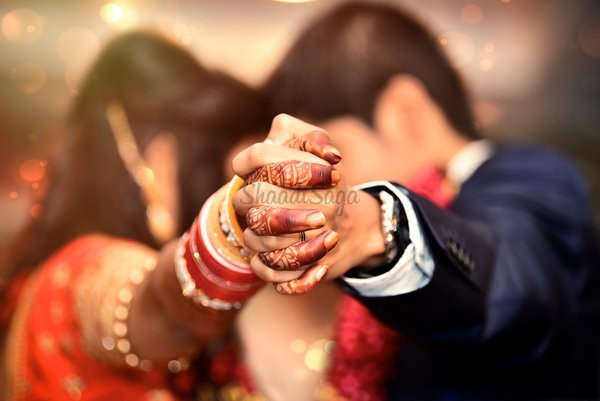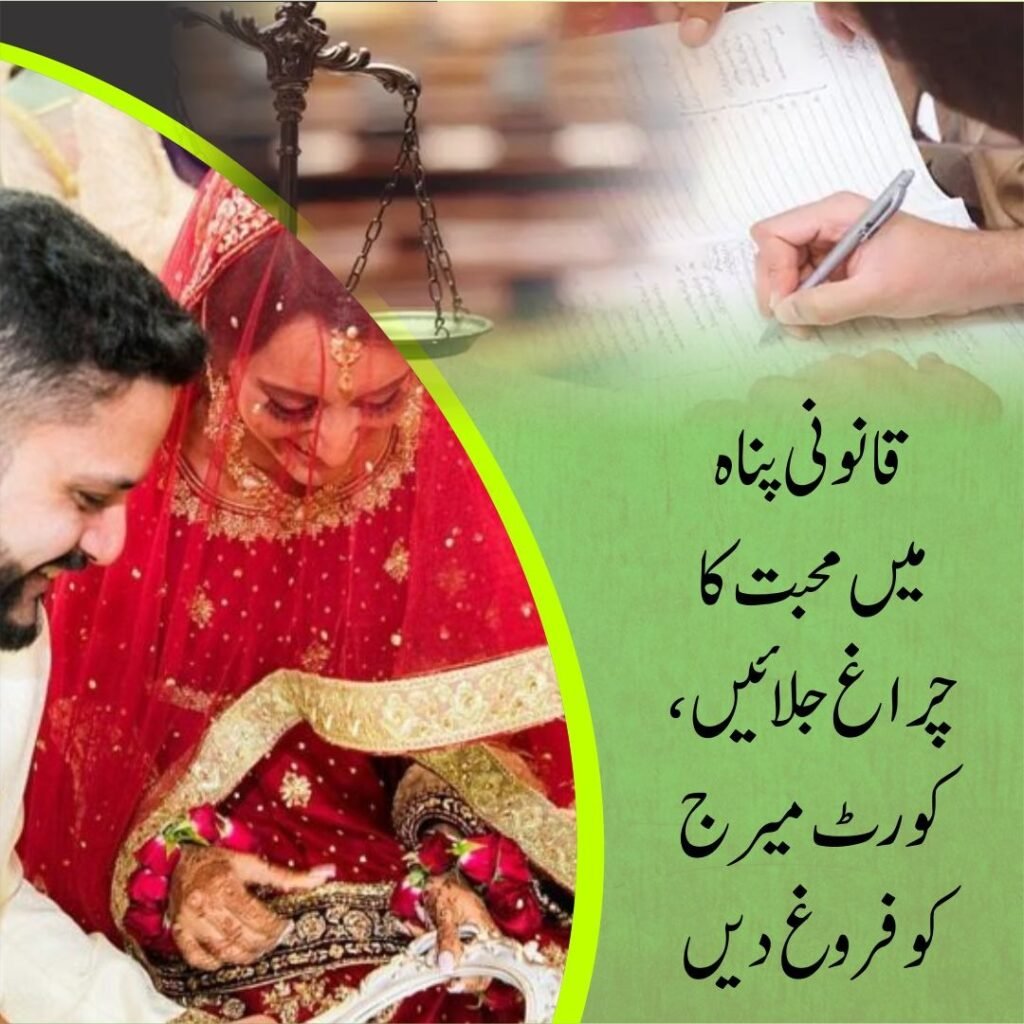Court Marriage or Civil Marriage in Pakistan | Karachi, Lahore, Islamabad
Get an answer to any query regarding Court Marriage/Civil Marriage!
Court Marriage or Civil Marriage in Pakistan & Civil Marriage/Court Marriage's Requirements and Procedure in Pakistan

Court Marriage or Civil Marriage in Pakistan: A Blend of Love and Legal Commitment
Court Marriage or Civil Marriage in Pakistan & Civil Marriage Requirements and Procedure: Civil Marriage and Court Marriage is the same in Pakistan. Civil marriages are conducted with the assistance of a legal professional, and the procedure is carried out by a religiously authorized individual, often a marriage registrar appointed by the local government. Civil Marriage and Court Marriage are synonymous in Pakistan, and the requirements and procedures for civil marriage in Pakistan are defined below. In Pakistan, civil marriage does not take place within a courtroom but, based on the preference of the marrying couple, it is solemnized through a Nikah Khawan, Imam, Molvi, Pastor, Priest, or a Hindu Pandit, respecting the cultural and religious diversity of the nation.
Court Marriage or Civil Marriage are Actually Love Marriages
In the diverse cultural landscape of Pakistan, the concept of a court marriage/civil marriage transcends the boundaries of mere legality; it embodies the essence of love, commitment, and the fusion of hearts. Civil marriage, or court marriage, is a unique union where love reigns supreme, and the legal intricacies are seamlessly interwoven. Here, we delve into the nuances of court marriages/civil marriages in Pakistan, highlighting the distinctive procedures and requirements that make it stand out in Karachi, Lahore, and Islamabad.
Love Prevails in Civil Marriage in Pakistan
In Pakistan, civil marriage or court marriage is not just a legal contract; it is a celebration of love and commitment. The beauty of these unions lies in the freedom to choose the officiating authority based on one’s faith. This unique characteristic distinguishes it from civil marriages in other parts of the world. Karachi, Lahore, and Islamabad, as major cities, embrace civil marriages with open arms, reflecting the rich tapestry of cultures and traditions that define Pakistan. Ultimately, love prevails, and civil marriages in Pakistan are a testament to the enduring power of love in the face of legalities.
Unlocking the Legal Elegance of Court Marriage and Civil Marriage in Pakistan’s Pinnacle Cities: Karachi, Lahore, and Islamabad
The Significance of Court Marriage or Civil Marriage in Karachi, Lahore, and Islamabad
Karachi, Lahore and Islamabad – In the vibrant urban landscape of Pakistan’s most prominent cities – Karachi, Lahore, and Islamabad – the realm of court marriage and civil marriage shines brightly. These cities, each with unique character and significance, host countless unions formalized through these legal avenues. At the heart of this legal commitment, you’ll find our dedicated legal service offices poised to facilitate court marriage and online marriage for those seeking to tie the knot. These three major cities in Pakistan bear witness to numerous court marriages/civil marriages, as they represent the diverse cultural fabric of the nation. Civil marriages in Karachi, Lahore, and Islamabad serve as a bridge between legal formalities and the cherished traditions and beliefs of the marrying couple.
Karachi: Where We Have Our 3 Court Marriage or Civil Marriage Offices
Karachi, the largest and most densely populated city in Pakistan, is a hub of diversity and culture. It’s here that we’ve established our strong presence, ensuring accessibility and convenience for those seeking court marriage and civil marriage services. Our trio of offices in Karachi is strategically located to cater to the diverse needs of the city’s residents.
Court Marriage in Karachi: Accessibility at Its Best
In Karachi, court marriage is a testament to love and legal commitment. It’s a harmonious blend of emotions and legalities, where marrying couples can choose the path that resonates with their faith and values. Our offices in Karachi ensure that accessibility and guidance are never out of reach.
Civil Marriage in Karachi: Uniting Hearts Legally
Civil marriage, often called court marriage, provides a platform for the legal unification of couples while respecting their religious and cultural preferences. In Karachi, the city’s rich cultural tapestry manifests in the diverse ceremonies and customs accompanying these unions. Our offices are strategically placed to provide legal counsel and guidance to marrying couples, ensuring the process is smooth and straightforward.
Lahore and Islamabad: Extending Our Reach
While Karachi takes the lead as the largest city, Lahore and Islamabad, as the capitals of Punjab and Pakistan, respectively, also hold great significance. We understand the unique legal needs of these cities and have expanded our services to ensure that the legal elegance of court marriage and civil marriage is accessible to all.
Court Marriage or Civil Marriage – Where Legalities Meet Love
In Karachi, Lahore, and Islamabad, the legal sanctity of court marriage and civil marriage is revered. These unions bridge the gap between love and the law, allowing marrying couples to embark on their life journey in a manner that resonates with their beliefs. Our presence in these cities is a testament to our commitment to making the legal processes of court marriage and civil marriage accessible to all, ensuring that love is celebrated with the respect and legality it deserves.
Court Marriage or Civil Marriage: A Path to Love and Legality in Pakistan
In Pakistan, civil marriage and court marriage are synonymous terms, often referred to as love marriages, as they are a testament to the love and commitment of the marrying couple. Unlike civil marriages in many other countries, where the process may be starkly different, in Pakistan, it is a harmonious blend of legal formalities and heartfelt emotions.
Court Marriage or Civil Marriage Requirements and Procedure in Pakistan
Court Marriage/Civil Marriage in Pakistan: Court Marriage/Civil marriage in Pakistan is a well-defined process that emphasizes the legal aspect of the union while respecting the couple’s religious and cultural preferences. The procedure is as follows:
- Legal Counsel: For a court marriage/civil marriage in Pakistan, the involvement of a lawyer is essential. This legal expert guides the couple through the process, ensuring all requirements are met.
- Religious Authorization: Court Marriage/Civil marriage in Pakistan is solemnized through a religiously authorized person, often a marriage registrar appointed by the local government. This choice caters to the diverse religious backgrounds of the married couple, allowing them to follow their faith while formalizing their commitment.
- Different from Other Countries: It’s important to note that court marriage/civil marriage in Pakistan differs from civil marriage in other countries. Here, it’s not a courtroom affair but a heartfelt union guided by the couple’s preferences. The marriage can be officiated by a Nikah Khawan, Imam, Molvi, Pastor, Priest, or a Hindu Pandit, depending on the faith and customs of the couple.
Civil Marriage in Western World & Developed Democratic Countries
Civil Marriage, in the west, conducted without Religious Rituals or Authority
In western world and developed democratic societies, a civil marriage means a marriage without any religious ritual or without interference of any religious authority. But, in backward societies of third world countries, a civil marriage is considered very different. Interreligious marriages are not allowed there. Civil marriage is also called as a court marriage in Pakistan. Requirements and procedure for civil marriage defined in detail. A civil marriage is not solemnized in court, but civil marriage is conducted in a Lawyer’s Office.
Civil Marriage: Requirements & Procedure
Civil Marriage or Court Marriage is not Solemnized in Court
Civil Marriage or court marriage: Requirements and Procedure for Court marriage & civil marriage defined in detail. In Pakistan, a court marriage or civil marriage is not solemnized in court. The words court marriage and civil marriage mean a marriage that is solemnized under the fundamental constitutional rights and law of the land.
There are two words used for love marriages in Pakistan, and these are “civil marriage” and “court marriage”.
The word civil marriage means a marriage that is solemnized under the basic constitutional human rights and law of the land. While the meaning of Civil Marriage is a legal contract or agreement.
Marriage Creates the Foundation of the Family
Marriage is a social institution that forms the foundation of the family. It is considered as a contract between two parties who form an alliance for living together for the rest of their lives with certain rules and regulations, rights, and duties to each other that are recognized by law.
Family Laws for Marriages in Pakistan
In Pakistan, there are many laws regarding marriage such as the Muslim Family Law ordinance 1961, Foreigner’s act 1946, Christian Marriage Act 1872, etc. For solemnizing your civil marriage, you have to follow some above-mentioned laws according to your religion and culture, but there must be at least one party involved in this civil marriage must be Pakistani citizen.

Civil Marriage or Court Marriage Procedure in Pakistan
In Pakistan, civil marriages are very different from western marriages as well as from a simple Pakistani marriage performed at home by a Nikah Khawan/Qazi/Molvi in front of many friends and family members. The couple receives a Nikahnama, a formal legal document, following a simple nikah, which requires the presence of two witnesses. There are, however, some additional steps and paperwork involved in the civil marriage procedure in Pakistan. In this process, a lawyer is essential because he or she can guide you through each step and ensure you meet all the requirements.
The civil marriage procedure in Pakistan can be divided into two simple steps:
- To begin with, the bride must sign an affidavit of free will affirming that she is an adult and free to marry without coercion. The relevant authorities should notarize this affidavit. An affidavit of free will is usually drafted by a family lawyer.
- Second, the lawyer will contact the Nikah Khawan or Registrar after receiving her affidavit. In cases where the couple or man is not Muslim, he will contact a Priest, Pastor, or Pandit based on their religion.
Marriage is Considered a Sacred Bond
No Civil Marriage in Pakistan without a Religious Person
In Islam, a marriage is considered a sacred bond between two individuals. A marriage contract (nikah) is considered an agreement between two people to live their lives together and build a family. It is not only meant for the purpose of having children but also to help each other in times of hardship and need. The Islamic Nikah has some basic requirements that must be met before the wedding ceremony can take place. Please keep in mind that civil marriages or common-law unions in western countries are very different from Pakistani society as civil marriages in the west are mostly secular but in the Islamic society of Pakistan, no civil marriage of such type exists. Here, no marriage (even civil marriage or court marriage) can not be registered unless religious rituals and a religious person (Molvi, Nikah Khawan, Pastor, Priest or Pandit is not involved.
The first requirement is that both partners must be adults (of legal age). They should also be sane, mentally stable, and have no physical or mental disabilities that would affect their ability to make decisions on their own behalf. Court marriages are always between two adults of the opposite sex.
The second requirement is that there must be two witnesses present at the time when Islamic Nikah takes place; these witnesses may be either male or female, two males or one male, and two females.
Civil Marriage or Court Marriage in Pakistan are More Popular than ever Before, there are Several Reasons for this
Civil marriages/court marriages in Pakistan are more popular than ever before, there are several reasons for this. These include:
- Parents’ involvement – If the parents of both families oppose the marriage, it is difficult to make arrangements and go through a traditional system. Therefore, civil marriage has proved to be a viable option.
- Breaking away from the traditional marriage system – Some people just want to break away from the inherent restrictions or complications associated with a traditional marriage system. They just want to have a simple, hassle-free, inexpensive ceremony without all the usual ritualistic and cultural ceremonies attached to traditional marriages. This is also an age-old tradition and continues to date, especially in rural areas where women are expected to remain unmarried because of certain social rules or customs, therefore they opt for court marriages as an easy solution.
- Rejection of traditional marriage system – Modern-day thinking has led many people towards rejecting the whole idea of a ‘traditional’ marriage system, therefore, opting for Civil Marriage/Court Marriage instead which does not require any religious rites or rituals and is considered more legal than religious marriages under Pakistani family law.
- Inability to meet costs of traditional marriage system – As mentioned earlier some people do not have sufficient funds required for arranging all the procedures and desired ceremonies required by a traditional Pakistani wedding, therefore, opting for Court Marriage/Civil Marriage instead which can be done at minimal costs (as compared to a Traditional wedding).

The Main Reason for Civil Marriage or Court Marriage in Pakistan is the Parents' involvement
One of the main reasons for court marriage/civil marriage in Pakistan is parents’ involvement, in order to get married both bride and groom must have proper permission from their parents, one of the grooms who want to do civil marriage has to give proof of her father or guardian’s permission.
Pakistani people are very traditional, and they follow all the rules and regulations properly, that is why parents play a very important role in all kinds of decisions as this will help them out to make sure that the marriage will be done with harmony and peace. Written proof from both parties is important to conduct any type of nikah or court marriage/civil marriage procedure. In case, either party gets involved on their own it may cause problems later in life after getting married, so it’s better to avoid such things. If parents are not willing to give their consent, then there are chances that a civil marriage will be conducted.
If You Want to do a Civil Marriage without your Parents' permission, Talk to our Court Marriage Expert Lawyer
Civil marriage or court marriage are actually love marriages. We arrange civil marriages, as per Pakistan law.
You can do love marriage/civil marriage without your parents’ permission, and you don’t need any approval from your parents. But if you are a minor (under 18) then you have to prove that you are adult enough to get married.
You have to prove that you are a Pakistani citizen (not applicable to foreign nationals) and ready for civil marriage/court marriage without your parents’ permission. You might be asked for your CNIC number or NICOP (National Identity Card of Overseas Pakistanis). If you cannot provide a copy of CNIC or NICOP then any other document, such as B’ Form, Board’s Matriculation certificate in original should be with you at the time of the proceeding.
If either party is not related to the other one, then it is not necessary to tell anybody about this, as there is no law that says that parents have the right to know about their son/daughter’s decision of getting married by himself/herself.
In Pakistan, at least one of the parties involved in civil marriage must be a Pakistani citizen
In Pakistan, at least one of the parties conducted a civil marriage must be a Pakistani citizen. Any male or female, who is a Muslim or non-Muslim, can get married under the law of Pakistan. If you are not a citizen of Pakistan then you cannot get married in Pakistan, however, if you are not a citizen of Pakistan, but you want to marry a Pakistani citizen under the law then it can be done.
In Court Marriage or Civil Marriage, in Pakistan, only Muslim males and females, or Muslim males and non-Muslim females can marry each other, but they must not be within prohibited degrees of relationship or affinity.
In court marriage/civil marriage in Pakistan, Muslim males and females or Muslim males and non-Muslim females can marry each other, but they must not be within prohibited degrees of relationship or affinity under section 4(b) or (c) of Muslim Personal Law (Shariat) Application Act,1937, if such party is related then no such marriage will be valid. A woman can not remarry after her divorce, until after the expiry of the period prescribed by law for Iddat.

What Are The Shari'a Requirements For Nikah during Civil Marriage?
A valid nikah is a contract. Hence, the contracting parties must be competent, i.e., they must be of sound mind and have attained the age of puberty. They must also consent to the marriage, or else it is not a binding contract.
The consent requirement has been defined as follows by the Federal Shariat Court:
“Consent means that there should be a real purpose on the part of both bride and bridegroom to enter into matrimony and not merely for namesake.”
For performing a valid Nikah you need to pay heed to these actions:
- The wali (female party’s father or elder brother or paternal uncle who can perform as her representative) needs to be present at the time of Nikkah. (As per Hanafi Fiqh, Wali is not necessary). In absence of her Wali, she has to declare herself a sui juris adult who wants to marry with her free will and consent and without her parent’s intention.
- Two witnesses need to be present at the time of Nikkah.
- The bride’s consent is mandatory for proceeding with the civil marriage ceremony.
Can Nikah For Civil Marriage Be Done Over The Phone?
If you are interested in court marriage/civil marriage, then you should have a clear idea about the legal aspect of civil marriage in Pakistan. This knowledge will help you get married without any hassle. I am going to tell you about the laws governing civil marriage and how can it be done in Pakistan.
The question that whether Nikah can be done over the phone is often asked by people who want to perform a civil marriage in Pakistan. The answer is yes, it is possible to do nikah even over the phone, but there are certain conditions that make it a valid procedure according to law.
For performing a civil marriage or court marriage, one has to do nikah necessarily, which is a religious procedure where two witnesses are required. This means if you want your nikah ceremony performed over the phone, then both parties must be present at their respective ends with two witnesses each for witnessing their agreement in front of Allah SWT by saying “Qubool Hai” (I accept).

Can I Do Nikah For Civil Marriage, Without Getting it Registered?
A nikah is a sacred act, so the nikah performed without registration is still valid as per Islamic Sharia, but not valid as per the law of Pakistan. Unregistered nikah has some serious consequences and problems.
For a valid nikah, you need to follow all the rules of nikah in Pakistan. After performing the Nikah ceremony, there are some rules and regulations that must be followed. You should get register your Nikkah, and this important step will save you from many problems in the future.

